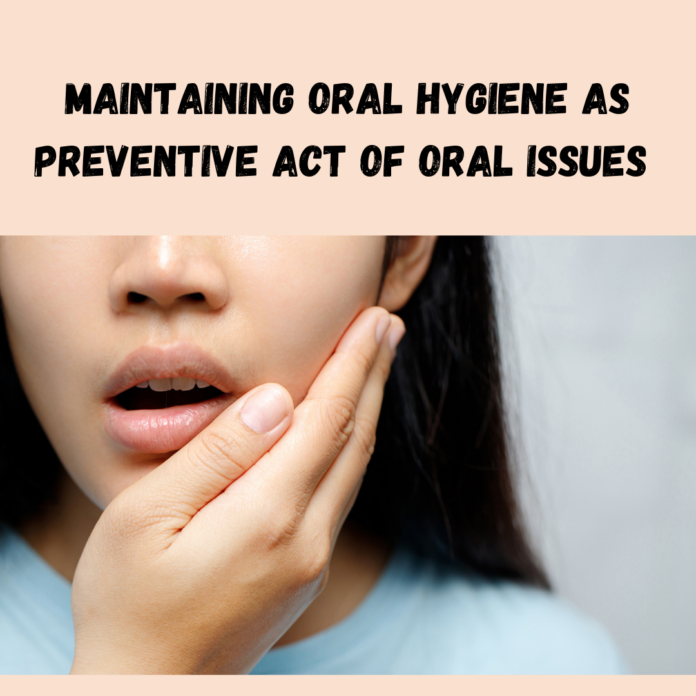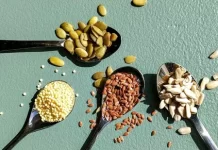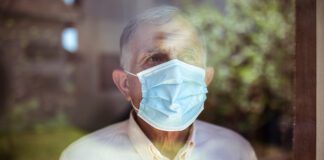Oral hygiene is the act of cleaning in the oral cavity, teeth, tongue, and gum. Many dental and oral issues happen because of the lack of oral hygiene. Oral health is the most important thing that can impact of life quality, so the understanding of oral hygiene is needed. The implications of oral hygiene can be:
- Maintain cleanliness of lips, teeth, gum, and tongue
- Prevent of the oral infections
- Moisture the oral mucous
- Fix the oral function to improve the appetite
- Prevent illness that can spread out from the oral
- Prevent dental and oral issues
A personal oral hygiene is influenced by factors that affect an individual. Socio-economics factor can influence the type and level of hygiene practices used, this can affect the client’s ability to provide dental hygiene support materials such as mouth was, toothpaste, and toothbrush. Humans who have been titled as social beings, give big effect that can affect personal hygiene. Adequate and proper education can increase awareness of oral health, so maintaining oral health is something that must be done. Groups of people who have physical or mentally limitations can inhibit the behaviour of maintaining oral hygiene independently.
Oral Immunity System
Oral cavity is the first place of food channel as a part of gastrointestinal tract and respiratory system, but also it can be the first gate of pathogen causing illness such bacteria, fungus, and viruses.
Oral cavity has its own natural cleansing system now as saliva. Saliva is complex fluid produces by salivary glands such parotic gland, submandibular gland, and sublingual gland that aimed to maintain the oral cavity. In addition, saliva also plays a role in the process of mastication, speech, and swallowing. Lack of saliva can increase the risk of developing oral issues. pH is also contributing to be a factor of dental issues, the lower the pH, the greater the risk.
The immune system itself is the first step in maintaining oral health. This system acts an agent of destroying pathogens that enter the mouth. The oral immune system is influenced by the mucous membrane which is made up of the epithelium as a mechanical barrier to infection. Extra oral lymph nodes are associates with soft tissue that form capillaries into large lymphatic vessels. The presence of jangsional epithelium in gingival cleft can be traversed by cellular and humoral components. The flow is a physiological process.
How to Maintain Oral Hygiene
In addition to relying solely on the body’s immune system, there are preventive steps to avoid risks due to poor oral hygiene, such as:
- Brushing teeth, introduction of techniques and how to brush teeth regularly and choosing the right toothpaste is very important to do from an early age. The most commonly used technique unfortunately it is and mistake that gradually leads to tooth abrasion and gingival recession. The best time to brush teeth is after breakfast and before sleep.
- Using mouthwash, the active ingredients contained are metal salicylate, chlorhexidine, and H2O2. Gargling is considered effective for maintaining oral health, an alternative to using mouthwash is using warm salt water.
- Using dental floss, the use of dental floss is very effective for cleaning between teeth that are sometimes difficult to reach by a toothbrush.
- Clean the tongue, debris that accumulates on the surface of the tongue is a source of disease and the emergence of Candida albicans sp. as pathogens.
- General check-up, coming to the dentist at least once every six months as a preventive measure, so that if a problem is found in the mouth, it can be treated immediately
The Risk of Bad Oral Hygiene
Poor oral hygiene can lead to risks that manifest either orally or systemically. The risk of the disease can have a disturbing effect on the patient so that proper and appropriate treatment is needed to handle the risks that occur. Oral-manifested risks that are often found include:
- Dental caries, is a disease of the hard tissues of the teeth caused by microorganisms that are progressive in nature characterized by tissue demineralization and damage to organic matter. The occurrence of dental caries is caused by the accumulation of plaque that continues to become caries which is marked by white spots as a sign of mineral decalcification which then becomes brownish holes and erodes the teeth.
- Periodontal issues
- Halitosis, is a common disease of the oral cavity in the form of bad breath. This can be caused by poor oral hygiene, causing dental plaque build-up and triggering infection.
- Gingivitis, One of the causes of this disease is poor oral hygiene. Gingivitis is usually characterized by swollen gums, redness, and bleeding easily. Treatments such as gingivectomy are required to treat the gingiva. Sometimes antibiotics are also needed
Systemic risk is the risk that occurs by targeting the body’s metabolism. Risks due to poor oral hygiene can trigger:
- Diabetic complications
- Osteoporosis
- Pneumonia bacteria
- Cardiovascular illness (heart attack and stroke)
With the explanation above, it is very clear about the importance of maintaining oral hygiene. Maintaining oral health can be done as an initial step in an effort to prevent problems that manifest orally or systemically. Although in the mouth already have agents that act as immunity, but getting used to brushing teeth twice a day, using dental floss, going to the dentist regularly, gargling with mouthwash, and cleaning the tongue are easy ways and can be done without the help and supervision of others.
Performing oral hygiene care is needed to prevent long-term risks that occur either orally or systemically. prevention is better than cure, because the most expensive thing is health










